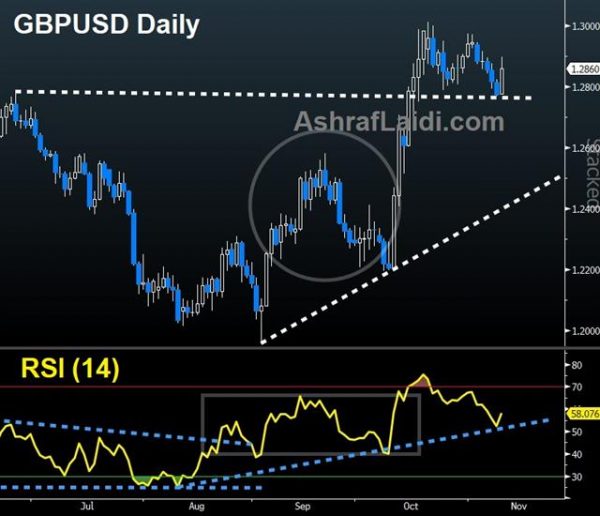The pound jumped by a full cent to 1.2898 after Brexit Party chief Nigel Farage said his party will not run in Conservative-held seats in next month’s election so as to help result into a victory for the Conservatives and for Brexit (More below). China’s consumer inflation hit 7-year highs, complicating the PBOC’s decision to cut rates last week. CFTC positioning data showed growing CAD longs and EUR shorts. This week’s market highlights include: UK jobs (Tues), UK and US CPI (Wed), Powell’s Congressional testimony (Wed), RBNZ rate decision (Thurs), UK retail sales (Thurs) and US retail sales (Fri). Gold printed 1448, stopping us out at 1450. A new Charts analysis on gold has been sent to the Premium subscribers.
Farage Decides
The pound’s surge emerged after Farage said his party will not contest the 317 seats held by the Conservatives in order to help Conservatives’ chances of winning Parliamentary majority and achieving Brexit. Farage said his Brexit Party will only contest the +320 seats in mainland Britain that are not held by the Conservatives on the rationale and assumption that they will be successful in defeating Labour in the Leave constituencies.
It would be a risk and danger to pound bulls in the event that Leave constituencies with marginal Conservative or Labour majority would vote for Labour instead of the Brexit Party, in which case would produce Conservatives win and Hung Parliament.
China Inflation Dilemma
Chinese CPI rose to 3.8% y/y in October in a surge from 3.0% in September. That was much higher than 3.4% anticipated as inflation has accelerated from 1.5% y/y in February. It’s the highest reading since January 2012.
The big caveat in the report is pork prices. They’ve jumped recently because of African swine fever and the trade war. The PPI report showed pipeline prices down 1.6% y/y, slightly worse than the 1.5% expected.
Last week, China’s central bank lowered one-year medium-term lending facility by 5 basis points from 3.30% to 3.25%. That has the spillover effect of lowering the loan prime rate (LPR) which is a growing part of the PBOC’s toolkit as new banking regulations come into effect next year.
While the drop in rates is token in size, it was likely a signal of more easing to come. A Global Times report Friday said monetary policy may ‘switch gears’ in the coming months to follow the worldwide easing trend. The CPI report probably won’t derail that plan but it may forced policymakers to be more cautious or patient.
Much of that will depend on how the trade war shakes out. Surging Treasury yields and record highs in the S&P 500 signal optimism but the White House continues to send mixed signals. Peter Navarro said on the weekend that there is no agreement to rollback any existing tariffs as part of the Phase One deal while Trump said reporting on tariffs had been incorrect.
No one has forgotten how Trump flipped the tariff script on July 31 with a tweet and everyone remains on guard for a repeat.
CFTC Commitments of Traders
Speculative net futures trader positions as of the close on Tuesday. Net short denoted by – long by +.
EUR -61K vs -53K prior GBP -29K vs -32K prior JPY -27K vs -20K prior CHF -14K vs -12K prior CAD +54K vs 44K prior AUD -27K vs -40K prior NZD -39K vs -40K prior
The soft Canadian jobs report on Friday surely sent a shudder through the crowded long CAD position but it’s a minor setback as job growth stands at its strongest pace in 16 years. Meanwhile, the euro continues to cement its reputation as the funding currency of choice. That should cap its upside even if the global economy picks up. Finally, AUD shorts were quick to cover following the RBA. This week, it will be interesting to see if NZD can rally even if/when the RBNZ cuts rates. That would be an early signal of a bottom.

